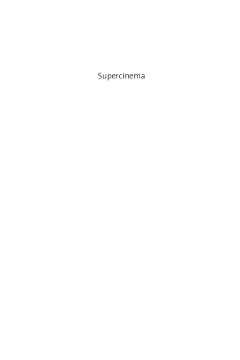
Additional Information
Book Details
Abstract
Drawing on a variety of popular films, including Avatar, Enter the Void, Fight Club, The Matrix, Speed Racer, X-Men and War of the Worlds, Supercinema studies the ways in which digital special effects and editing techniques require a new theoretical framework in order to be properly understood. Here William Brown proposes that while analogue cinema often tried to hide the technological limitations of its creation through ingenious methods, digital cinema hides its technological omnipotence through the use of continued conventions more suited to analogue cinema, in a way that is analogous to that of Superman hiding his powers behind the persona of Clark Kent. Locating itself on the cusp of film theory, film-philosophy and cognitive approaches to cinema, Supercinema also looks at the relationship between the spectator and film that utilizes digital technology to maximum, ‘supercinematic’ effect.
William Brown is Senior Lecturer in Film Studies at the University of Roehampton, London. He has written articles for journals and edited collections with a particular emphasis on the use of digital technology in contemporary cinema across a range of national and transnational contexts. He is also a filmmaker, having made four feature films since 2009.
“With this challenging book, William Brown shows how cinema is a powerful and living machine of thought with which we can build productive and innovative interactions in a way that allows us to call into question entire metaphysical systems, thus making of the seventh art an instrument for philosophical thought in all its complexity.” · New Review of Film and Television Studies
“The author presents … an innovative perspective on cinema in the digital age. From the opening page, we encounter an articulate writing voice that presents a broad agenda for the study of contemporary cinema – with Fight Club standing in as a constant reference point.” · Warren Buckland, Oxford Brookes University
“This is an excellent, provocative book that I enthusiastically recommend… The author succeeds in helping to forge a new paradigm by which to conceptualize and theorize cinema in the era of the digital. This is important work, because too often, when writing about contemporary cinema that is “digital” either in its technical specifications or aesthetics, we are forced to rely on terminology and concepts imported from pre-digital cinema.” · Nicholas Rombes, University of Detroit Mercy
